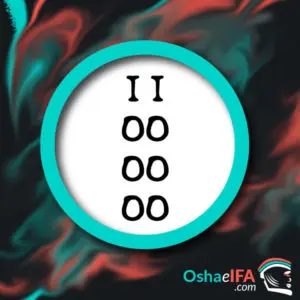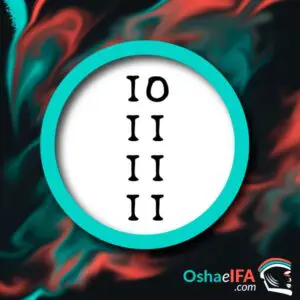Kuleya Bear (Osa Ogunda)

Osa Ogunda, also known as Osa Kuleya, occupies place number 160 in the Lordly Order of Ifá, marking a deep reflection on both physical and spiritual self-preservation. This Odu emphasizes the importance of taking care of oneself in all aspects of life, thus ensuring the manifestation of Ire (well-being) and good fortune.
General description of the Odu of Ifa Osa Ogunda
The Odu of Ifá Osa Ogunda displays a vast spectrum of essential teachings and warnings for those who receive his revelation. This sign extends from the creation of the library, a symbol of accumulated knowledge and wisdom, to the emblematic figure of Ogún carrying the weight of the world, reflecting strength and determination. Additionally, it addresses the profound curse of Olofin that exalts Ifá above all other religious practices.
What is born in the odu of Ifá Osa Kuleya?
- Oyá's nickname: Iyanza or Yanzan.
- To begin any Ifá ceremony or work you have to "moyubar."
- The ceremony of going to take Ogún out of the mountain when some of his children are going to be crowned to Ogún.
- Oyá's virtue, but she lost her strength.
- The secret of herbs to wash Ogún.
- Agbon, Imo and Oye, who later became Hoo-Ro (Gold), and on earth is Ela.
- The Throne of Ifá, which is the chair of wisdom.
- Ifá libraries were born.
- The secrets of the jicotea and the fish.
What does the Ifá sign Osa Kuleya talk about?
- It was where Oyá, to save her children, stopped eating mutton and gave it to Shangó.
- This is where the Awoses store papers of secrets and do not study them.
- It was where Olofin cursed all religions.
- The doors of Ife were closed.
- The Babalawo does not walk alone.
- The person has transcendence of garments of ancestors and inheritance of garments or Orishas.
- There is an Egun who will destroy the whole family.
- A medical spirit talks to the person.
- The wife does work to knock down the husband.
- It is an Ifá of slavery.
- It indicates loss of voice.
What does the Ifá Osa Ogunda sign mark?
- The head is not requested with fish that have a small tongue.
- The person can be tied up. It is also crazy.
- They put Ogún to support the World.
- The secret of Cao was revealed.
- Otupon Ogbe was given the secret to finish making the Ilú-Baata.
- He suffers from vertigo, cannot climb height and dies alone at the table.
- Shangó discovered the sensation in Oyá's clitoris and she went crazy when Shangó left.
Discover the power and history of the warrior Orisha Oyá, lady of the winds and guardian of the cemetery.
Analysis and Reflection of the Ifa sign Osa Ogunda
Osa Ogunda It is a sign that emphasizes the importance of self-preservation, caution in interpersonal relationships, and the need for appropriate sacrifices to ensure good fortune. The figure of Oyá (Iyanza or Yanzan) stands out as a protector and sacrificial mother, who to save her children renounces the ram, giving it to Shangó. This act of self-denial illustrates the essence of Osa Kuleya: personal sacrifice for the greater good. The creation of Ifá libraries under this sign symbolizes the accumulation of knowledge and wisdom, but also warns against inaction derived from not applying said knowledge.
Economic Aspects
From an economic perspective, Osa Ogunda suggests that prosperity comes with diligence and making necessary sacrifices. He notes that success in business and the workplace can be achieved, but warns against complacency. The reference to Ogun holding up the world underscores the need for constant hard work to maintain balance and ensure progress. This Odu warns against modern slavery, whether in the form of work dependency, family dependency, or vices, urging us to seek liberation through conscious action and sacrifice.
This sign teaches us about the foundation of the library and the role of the librarian, who is dedicated solely to storing books without using them for their own learning and intellectual growth. Osa kuleya It warns us about the danger of accumulating knowledge without applying it in our lives. It is a call to reflect on the importance of not only acquiring information, but also of using it in a way that enriches our personal and professional development. It urges us to avoid falling into the trap of being mere data collectors, and instead to strive to turn knowledge into applicable wisdom.
"Salud"
In the field of health, Osa Ogunda it specifically mentions the risk of vertigo and the inability to face heights, possibly symbolizing internal fears and personal challenges that must be overcome. The loss of voice can be interpreted as a metaphor for the loss of personal power or influence, suggesting the need to regain inner strength to express oneself and assert oneself in the world.
Religious Aspects
Religiously, this Odu speaks of the importance of correct rituals and sacrifices to maintain balance and harmony with the spiritual world. The mention of ceremonies for Ogun and the need to moyubar (greet and ask permission) before any spiritual work underlines the reverence and respect for the traditions and the Orishas. This sign warns about the consequences of not properly caring for the Eguns (spirits of the ancestors) and the Orishas, which can lead to family or personal disasters.
Personal Relationships (Love)
In love, Osa Ogunda offers a cautious view. The story of Oyá giving up the ram for his children and giving it to Shangó symbolizes the importance of sacrifices in personal relationships. However, he warns against deception and disloyalty, especially in the case of women who can be seduced by empty promises. This Odu suggests that fidelity and honesty are essential to maintaining healthy and long-lasting love relationships.
Osa kuleya He is an Odu of profound teachings and warnings, who guides his followers towards reflection and conscious action in all aspects of life. It emphasizes the importance of sacrifice, respect for traditions and the need to apply acquired wisdom. Likewise, it emphasizes vigilance in personal relationships and the search for authenticity and inner strength. This sign offers a path to spiritual and material growth, as long as you are willing to face challenges with courage and determination.
Immerse yourself in the legend of Oggun, the Orisha who forges destiny with iron and fire. Learn about its influence on everyday life and its veneration in spiritual practice.
Recommendations of the Ifa Odu Osa Ogunda:
- Make the Necessary Sacrifices: It is crucial to make appropriate sacrifices to ensure protection, good fortune and balance in life.
- Value Knowledge: Accumulating wisdom through study and reflection is encouraged, but with a commitment to apply said knowledge in a practical way.
- Work hard: Dedication and continuous effort are essential to maintain balance and achieve success in all areas of life.
- Respect Traditions and Rituals: It is essential to correctly follow the rituals and traditions of Ifá, showing respect for the Orishas and the ancestors.
- Attend to the Eguns and Orishas: Maintain a harmonious relationship with the spirits of the ancestors and the Orishas through appropriate offerings and rituals.
- Moyubar before any spiritual work: Greeting and asking permission from the deities before starting any Ifá ceremony or work is crucial for the success of religious practices.
- Care in Personal Relationships: Promote honesty, fidelity and open communication in loving and personal relationships.
prohibitions
- Do not Neglect the Sacrifices: Avoid negligence in making necessary sacrifices, as this can lead to negative consequences.
- Do not ignore acquired knowledge: Accumulating knowledge and not applying it is as harmful as not knowing. Inaction resulting from unused knowledge is prohibited.
- Don't Be Complacent: Complacency in work or spiritual practices can result in loss of balance and prosperity.
- Do not neglect the Eguns and Orishas: Ignoring the needs and offerings of ancestors and deities can bring personal and family misfortunes.
- Do not Start Rituals without Moyubar: Starting any spiritual activity without due respect and permission from Olofin and the deities is highly discouraged.
- Avoid Deception and Disloyalty in Love: Caution must be taken to avoid falling into deceptive relationships or being unfaithful, which can lead to loss and suffering.
- Avoid Love Relationships with Children of Shangó: Women should avoid having romantic relationships with Shango's children, as it is warned that they could be deceived. This prohibition highlights the importance of caution in romantic relationships and suggests a deep respect for the specific dynamics and energies of the Orishas within personal interactions.
- Don't Neglect Health: Ignoring health warnings, especially those related to vertigo and loss of voice, is ill-advised.
- Avoid Modern Slavery: Whether for work, family relationships or vices, it is urged to seek liberation and independence.
- Don't Disregard Visitors: It is prohibited to despise or belittle those who come to your home. Showing hospitality and respect to visitors is essential, reflecting the importance of generosity and respect in Yoruba culture.
- Not Acting as Guarantor: Warns against acting as someone's guarantor. This suggests avoiding financial or legal commitments by third parties, possibly to prevent complications or difficulties that may arise from such responsibilities.
- Avoid the Practice of Multiple Religions: It is prohibited to attend and perform rituals belonging to different religions, emphasizing that Ifá is the only religion blessed by Olofin. This prohibition underlines loyalty and exclusive dedication to the path of Ifá, highlighting its uniqueness and Olofin's direct blessing on its practices and teachings.
Sayings of the Sign of Ifa Osa Kuleya:
- War with the living is bad, with the dead it is worse.
- If he has a big fish, you must feed the stream.
- Tie up the boat so it doesn't sink.
- When I make sacrifice, I have good fortune.
- If I don't organize my life, I'll be like Cao.
- Wisdom, intelligence and understanding represent Ela.
- The great sacrifices are made by mothers for their children.
"Moor the ship, so it doesn't sink" teaches us about foresight and responsibility in life. This saying highlights the importance of taking preventive measures and being prepared for adversities before they occur. It symbolizes the need to secure our bases and protect our projects and interests against unexpected storms. Just as a sailor prepares and secures his ship against the possibility of a storm, we must care for and protect what we value, preventing adverse circumstances from overcoming us and leading us to failure.
Ifa code of ethics of the odu Osa Ogunda:
- The Awó does not go to other religions because Ifá is the only religion blessed by Olofin.
You may also be interested: Treaty of Oddun Ifa: Osa Meyi.
Meaning of Oddun Osa Ogunda (9-3):
The meaning of Odu Osa Ogunda reveals profound teachings and warnings for those under its influence. This sign indicates that people who believe they know everything in life and do not recognize the merits of others will eventually face humiliation. Highlights the importance of humility and recognition of the value of others.
Yemayá Ashaba, who lives in an amphora adorned with 21 links of chain and an anchor, symbolizes protection and maternal strength. This aspect highlights the need for care and protection, especially in moments of vulnerability, such as during pregnancy, where it is recommended to perform Ebó to ensure the well-being of the child.
The warning to be cautious with companies and the possibility of being victims of deception highlights the importance of prudence in interpersonal relationships. The mention of ORUNMILA as the savior of minor children underlines the divine protection available through proper rituals.
This Odu emphasizes obedience and respect for traditions, indicating that disobedience can lead to severe consequences, such as slavery to the greed of others. The need to change residences and caution against the dangers of the countryside and exposure to storms highlight the importance of personal safety and well-being.
Osa Kuleya speaks of promotion and success, as long as the necessary precautions are taken and negative influences are avoided. Connecting with Ifá and receiving his teachings is crucial to overcoming challenges and achieving fulfillment.
The sacrifice of Oyá, who stopped consuming mutton for her children, giving it to Shangó, illustrates the depth of maternal love and the importance of personal sacrifices for the good of loved ones. This Odu also remembers the creation of Ifá libraries and the accumulation of knowledge, although it warns about inaction derived from not applying said knowledge.
The exclusivity of Ifá as a religion blessed by Olofin, protection against theft through the use of shifting earth mud in the Ebó, and communication with spirits, including the spirit of a doctor, highlight the connection between the physical and spiritual world. .
The secrets of the jicotea and the fish, the ceremony to remove Ogún from the mountain, and the warning about the loss of one's voice, whether due to temporary or permanent causes, underline the importance of caution and respect for the mysteries of the life.
In summary, the meaning of Osa Ogunda warns against arrogance, underlines the importance of sacrifice, spiritual protection and obedience to traditions. This Odu teaches that knowledge and prudence are key to navigating life's challenges, ensuring well-being and success on the spiritual and earthly path.
Ifa says in the Oddun Osa Kuleya (Ogunda):
You must avoid conflict and exercise caution when exploring the countryside, protecting yourself from inclement weather. Receiving Orunmila is essential, as she will face challenges such as unexpected encounters with justice and requests from Ogun. She thanks her Guardian Angel, Shangó and Obatalá; Respect and Ebó are crucial to overcome obstacles.
Your strong temperament and possible losses, whether in health, employment or business, require attention. An adversary seeks to harm you, but you can protect yourself through specific rituals, especially if there is a risk of losing a pregnancy. Avoid visits to prisons and decline invitations to hunt or fish, which could end in tragedy. The need to change residence arises from previous tensions or disagreements. Always remember to show gratitude to Orunmila and offer hospitality to those who visit your home, thus maintaining harmony and balance in your life.
Prayer of the sign Osa Kuleya Ifa:
OSA KULEYA WARA WARA AYE WARA WARA ORUN ADIFAFUN OSHUMARE
AKUKO LEBO, AHUN AJAPA TIROKO AFETU AFOLOPO ADIFAFUN UMBO
OUN BATINLO LOKO ODE GBOGBO TENUYEN LEBO BOBAYO OLUWO LAKI
OYUBONA LABERE ADIFAFUN ARETIN SHOMO BANI ORUNMILA OMA
KURE LEBO OLEBO AKARAN NIRU ESHU SHAFT EKURE ONI SHANGO OLE
NINSHAWO ARA AWO ERIN ARABAYE ISHU AKARA ADIE LEBO AKUKO
EYELE LEBO.
Suyere Osa Ogunda:
OLOMIDE TIRE EGUADO LERI AYAPA OSA KULEYA
Ebboses (Works) of Odu Osa Ogunda:
Work by Osa Kuleya to Solve Problems with the Help of Oyá
For this work, a lamp is prepared using a clay pot and cooking oil, to which 9 wicks are added. While it is prepared, the song dedicated to Oyá is sung:
"Oyá Iyanzan Bilari Mokakeño Ina Ina Osa Kuleya."
Once lit, the lamp is placed in front of Oyá along with two glasses, one with melon soda and the other with red wine. These offerings are left in front of Oyá during the days that Ifá specifies.
Ebbo de Osa Ogunda (9-3) to Attract a Partner and Economic Prosperity
To attract a husband and money, the following is presented to Oyá: nine "loaves of glory" and a gourd with beer. Then, the following request is made to Oyá, adjusting the prayer according to the gender of the person performing the ebbo:
- Woman prays: «Oyá Egun Otimpa Eba Oko Bami. Eba Owo Bami.
- Man prays: «Oyá Egun Otimpa Eba Obo Bani. Eba Owo Bami.
Inshe Osanyin:
For this ritual you need the head of a jicotea, two thighs of another jicotea, heart and intestines, as well as soil collected from four corners and from the entrance of the town. When taking the land, it must be pronounced: "Osanyin Ewe Yeye, I collect you to serve me in health, luck and to ward off my enemies."
These works, when carried out with faith and following precise instructions, seek to channel the spiritual energy of Oyá and Osanyin to solve specific problems, attract love and prosperity, as well as protection and general well-being.
You may also be interested: Oddun of Ifa Ogunda Mass
Osa Kuleya in Traditional Nigerian Ifa.
ÒSÁ ÒGUNDÁ
Àkò ò lerán lésè tee de gbonrangandan ojúgun
A day fún Òrúnmìlà
Níjó tí n lo rèé fi Bòmbò as Òrìsà sayà
Òrúnmìlà ló fé Bòmbò Omo Òòsà
Gbogbo I will go to you yes I nlé è
Gbogbo è bá n padàá dé
Ayé ye Òrúnmìlà
Ní wá n jó ní n yò
Ní n yin àwon Babaláwo
Àwon Babaláwo n yin Ifá
Ó ní béè làwon Babaláwo tòún wí
Àkò ò lerán lésè tee de gbonrangandan ojúgun
A day fún Òrúnmìlà
Níjó tí n lo rèé fi Bòmbò as Òrìsà sayà
Wón ní ó saca káalè ebo ní ó se
Òrúnmìlà gbébo nbè ó rbo
Aww, yes, you
Ajé n padàá bò wa
Omito sun lo lara eja
Kò sàì sàn wáá béja lódò
Aya to you yes it
Omo to you, yes it
Gbogbo I will go to you yes it
Wón n padáá bò wá
Omito sun lo lara eja
Kò sàì sàn wáá beja lódò.
All the good fortunes that had eluded this person will return. Ifá advises him to sacrifice a large fish (Cat Fish) and pigeons. Ifá advises you to place the fish in the sacrifice, they should open the mouth of the fish and pour Ifá powder in it and then use it to sacrifice Ifá. All good things would return.
It is the Àkò bird that has no meat on its calf
He made divination for Òrúnmìlà
The day he was going to take Bòmbò, Òrìsà's daughter as his wife
It was Orúnmìlà that Bòmbò married
All the good things that had departed from your home previously
They came back
Life pleased Òrúnmìlà
He then also began to dance and rejoice
He was praising his Babaláwo
His Babaláwo was praising Ifá
He said it was exactly as his Babaláwo had said
It is the Àkò bird that has no meat on its calf
He made divination for Òrúnmìlà
The day he was going to take Bòmbò, Òrìsà's daughter as his wife
They advised him to take care of the land and make the sacrifice
Òrúnmìlà heard about the sacrifice and performed it
The wealth that had departed
Is coming back
The water that threw the fish
It will flow back until it meets the fish in the river
The wife who had departed
The son who had departed
All the good things that had departed
They are all coming back
The water that threw the fish
It will flow back until it meets the fish in the river.
Patakies (Stories) of the Ifa sign Osa Kuleya:
The son of the King who did not listen to Orunmila's advice
Orunmila warned the King about his son, recommending that he not allow him to hunt. Despite assigning servants to protect him, the boy, passionate about hunting, created a stir. One day, while his guards were distracted, he saw a pigeon passing by, aimed his wave, and shot it down. The pigeon fell into a nearby river, and when trying to retrieve it, the boy slipped and also fell into the water. In his desperation, a girl offered to save him in exchange for becoming his slave. After being rescued, the boy was trapped inside a drum owned by the jicotea, who claimed to have a drum that he played alone.
Distraught by the disappearance of his son, the King consulted Orunmila again, who suggested organizing a great party and inviting all the musicians in the city, promising that his son would appear during the event. This was done, and when it was the jicotea's turn to play her drum, the boy began to sing from within, revealing his location to everyone present. Following Orunmila's instructions, the King ordered the musicians to be removed but left the instruments to present the awards the next day. When they were alone, they took the boy out of the drum and placed a drum in his place.
Explanation: The story emphasizes the importance of listening to and following the advice of those who possess greater wisdom and experience. Orunmila, representing the voice of prudence and knowledge, warns the King about the dangers that threaten her son if he persists in his love of hunting, a warning that is ignored with almost tragic consequences. The son's disobedience not only endangers himself, but also leads him to a situation of servitude under the jicotea. Orunmila's final intervention rescues the boy, teaching that repentance and correction of our mistakes are possible with the right help and guidance. History reminds us that ignoring wise advice can lead us to situations of danger and despair, from which we can only get out by listening and acting in accordance with the wisdom offered.
La Jicotea Grande
In Aguado Nile, there lived a humble fisherman named Akeme, renowned for his skill with the harpoon and net. One day, while walking along the seashore, Akeme saw a child mistreating a small toy. Compassionate, he rescued her and returned her to the sea. Some time later, while he was fishing, he heard a voice calling him from the water; It was the jicotea that he had saved, who revealed himself as Osa Kuleya, the fortune teller of Olokun, the monster of the seas. Grateful, the jicotea offered to teach Akeme his trade and take him to his marine kingdom, full of wonders.
Akeme accepted and, in that kingdom, he fell in love with Asesu, the Obá's daughter, with whom he lived happily for 300 years. However, due to the different perception of time between sea and land, 3,300 years had passed on the surface. Upon returning, Akeme found the world unrecognizable from him. Desperate, he opened a magical güiro that had been given to him, hoping to find a power that would compensate him, but only white smoke and a voice that sang "Osa Ogunda" emerged. At that moment, he suddenly aged, transforming into what we know today as a great jicotea, bearer of the secrets of both worlds through the centuries.
Explanation: This story teaches about the consequences of our decisions and the importance of respecting the unknown. Akeme's compassion earned him a place in a wonderful world, but his inability to accept the irreversible change in his earthly life led him to an eternal wanderer's existence between two worlds. The moral underlines that despite our good deeds, we must be aware of the realities we face and accept them. Furthermore, it reminds us that seeking magical solutions to complex problems can have unexpected consequences. Akeme, in his desire to recover what was lost, lost even more, becoming a being who, although full of wisdom, is condemned to carry the burden of secrets without being able to return to his old life.








Thank you very much I deeply appreciate your teaching
Very good at stories
5 days ago I had my ifa festival #4 and I met the odu osa ogunda.
MY NAME IS MIGUEL BOVER I AM A PRIEST OF IFA
AND I AM OSA KULEYA I REALLY LIKED HER NARASION
I understand that the story pertains of a male what happens when a female has this sign which is Osa Kuleya what does the woman have to do to resolve her situations?